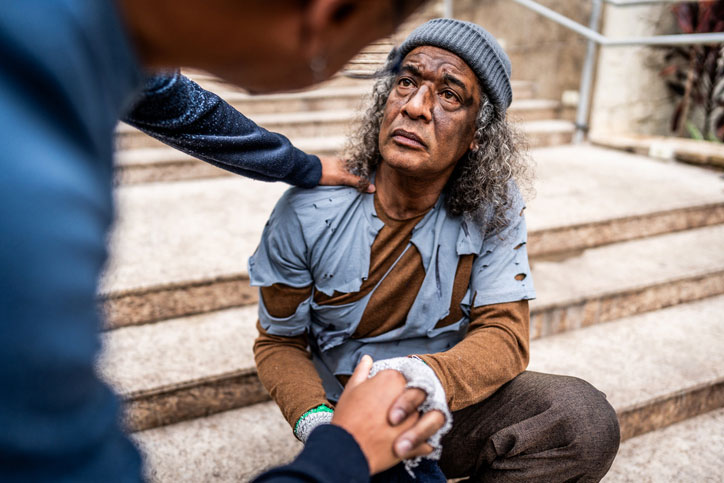Written by Dr. Emily R. Thornton, PhD, LCADC , Last Updated: November 4, 2025
Substance abuse counselors perform 12 Core Functions including screening, assessment, treatment planning, counseling, case management, and crisis intervention. They work in outpatient clinics, residential facilities, hospitals, and community settings, providing individual and group therapy while coordinating care with medical professionals and supporting families through the recovery process.
Table of Contents
Every day on the job is a chance to save a life. That's the reality for substance abuse counselors working across America's addiction treatment system. From crisis intervention in emergency rooms to long-term recovery support in residential facilities, these professionals serve as critical touchpoints for patients and families navigating the path to recovery.
The work goes far beyond what most people imagine. While the public may picture one-on-one counseling sessions, the day-to-day reality involves assessment, treatment coordination, family education, crisis management, and constant collaboration with medical providers, social services, and community resources.

The 12 Core Functions Framework
The foundation of substance abuse counselor work can be broken down into 12 Core Functions originally developed more than 40 years ago. These functions provide a comprehensive framework for understanding the scope of responsibilities counselors handle daily.
The 12 Core Functions are organized into interconnected areas of practice:
- Screening - Initial evaluation to determine if substance use issues are present and if the individual needs treatment services
- Intake - Administrative and initial data gathering to admit individuals into the treatment program
- Orientation - Describing to clients the general nature and goals of the program, rules governing client conduct, and the available services
- Assessment - In-depth evaluation to identify and evaluate an individual's strengths, weaknesses, problems, and needs for treatment planning
- Treatment Planning - Developing individualized plans that specify goals, objectives, and strategies to address identified problems
- Counseling - Providing individual, family, and group counseling to help patients develop coping strategies and recovery skills
- Case Management - Coordinating services and resources for clients, including referrals to medical care, housing, legal services, and employment assistance
- Crisis Intervention - Responding to acute psychological or behavioral crises, including overdose situations and psychiatric emergencies
- Client Education - Teaching clients about addiction, recovery processes, relapse prevention, and life skills
- Referral - Identifying and connecting clients with services beyond the counselor's scope of practice
- Reports and Record Keeping - Maintaining accurate documentation for treatment planning, legal compliance, and insurance purposes
- Consultation - Collaborating with other professionals to optimize client care and professional development
These functions were later expanded with Global Criteria that detail specific steps counselors take within each function, from documentation requirements to selecting evidence-based treatment methods to ensuring legal and ethical compliance.
The point is clear: substance abuse counselors juggle multiple complex responsibilities daily. But no matter what the official processes look like, all functions ultimately serve one purpose: helping counselors become trusted resources that patients and families can turn to during the recovery journey.
Behind-the-Scenes Work of Substance Abuse Counselors
While the 12 Core Functions establish a framework for daily work, some of the most critical aspects of the job remain invisible to patients.
Counselors are constantly observing and assessing. They track eye movements, notice tell-tale stains on skin or clothing, and detect the faint odor of mints covering up alcohol on the breath. This vigilance becomes second nature. Formal assessment tools like the Drug Use Disorders Identification Test (DUDIT) and the Alcohol Use Disorders Identification Test (AUDIT) supplement these observations.
All this information feeds into treatment planning. Plans are constantly revised, approved by supervisors, and coordinated with other service providers. Arranging for additional supports is often critical to effective therapy. A client seeking illicit medication for chronic pain needs medical care to address the underlying issue first, for example.
At clinical levels, substance abuse counselors provide more complete and complex treatments. Working with physicians, they develop plans that may involve medication-assisted treatment, such as naltrexone for alcohol use disorders or methadone to block opioid effects.
Patients may receive psychotherapy to address root causes driving their addiction. Counselors also provide practical strategies to help clients through difficult moments: meditation techniques, substitution exercises, safety planning, and coping mechanisms.
Through phone conversations, group therapy sessions, and in-person visits, addiction counseling involves constant personal contact and conversation.
There's also a steady stream of personalized affirmation and motivation flowing to clients according to their treatment plans. They need to hear that they're worthwhile and worth saving. This emotional support is as critical as any clinical intervention.
Given the scale of substance use disorders in America, much of the treatment offered comes through group counseling sessions. This approach allows counselors to serve more clients while leveraging the power of peer support and shared experiences.
Where Substance Abuse Counselors Work

The natural domain for U.S.-based substance abuse counselor jobs is the human services industry. This complex web of agencies, nonprofits, and contractors revolves around addressing social problems and supporting individuals who have fallen through the cracks. Substance use disorder patients make up a substantial portion of those served.
Substance abuse counselors are a vital piece of the human services sector. They also rely on other services within it to assist with critical housing, healthcare, and food supply needs without which many clients can't recover.
According to SAMHSA's 2022 National Survey on Drug Use and Health, almost 60 percent of Americans over the age of 12 reported using tobacco, alcohol, or some illicit drug in the month prior to the survey. Not all of those uses are abuses. But SAMHSA estimates that around 20 percent are experiencing substance use disorders needing treatment, yet less than 5 percent receive it.
The drug and alcohol addiction treatment industry was worth $42 billion in 2020 and is projected to reach $53 billion by 2025, primarily funded by states and private insurers.
Substance abuse counselors take to the streets and to people's homes, and also offer their services remotely.
Although funding comes through state government initiatives in most cases, it's becoming more common to see addiction counselors working in dedicated treatment facilities that are privately owned. These clinics frequently specialize in specific forms of addiction.
Treatment for everything from prescription painkillers like OxyContin to illicitly manufactured street-grade synthetic opioids like fentanyl is in particularly high demand. Alcohol addiction continues to be a perennial and growing problem, though it gets less media attention than the opioid crisis.
Treatment Setting Types and Responsibilities
The places where substance use disorder counselors work, and the treatment styles that accompany them, fall into several categories that define job responsibilities:
- Outpatient - Like other clinics, patients visit for appointments but primarily engage in activities of daily living outside counselor oversight. Counselors conduct scheduled therapy sessions, monitor progress, and coordinate care.
- Inpatient - Inpatient treatment is more intensive, similar to hospital or nursing facility care. Counselors oversee almost all aspects of daily routine, interspersed with formal therapy or treatments. This setting requires more intensive crisis intervention skills.
- Residential - Residential facilities are more long-term than other inpatient programs and often offer more flexibility. They bring together groups of patients who may continue to work and have outside activities. With on-site counselor supervision, participants assist one another in their recovery efforts. Sober houses and recovery facilities fit this description.
- Interim and Emergency - There aren't enough treatment slots for every patient in the system, so some counselors work in the field, focusing on crisis situations as individuals experience substance-induced emergencies, including episodes of psychosis. This can include outreach efforts in homeless camps or serving as counselor at medical facilities.
Increasing numbers of substance abuse counselors are working remotely. While it's a field traditionally dependent on personal touch, the necessity of delivering safe services during the COVID-19 pandemic created a crash course in telehealth treatment.
Research published in the Journal of Substance Use and Addiction Treatment has shown that remote substance abuse counselors can be very effective. With the flexibility and cost advantages remote services offer, this trend is likely to accelerate.
Essential Skills for Substance Abuse Counselors
Beyond the technical knowledge covered in substance abuse counseling degree programs, successful counselors develop several critical competencies:
- Empathy and Compassion - The ability to understand clients' struggles without judgment while maintaining professional boundaries
- Communication Skills - Clear, effective communication with clients, families, medical staff, and other service providers
- Crisis Management - Staying calm under pressure and making quick decisions during emergencies
- Cultural Competence - Understanding how cultural backgrounds, socioeconomic factors, and identity affect substance use and recovery
- Active Listening - Hearing what clients say and don't say, reading body language, and detecting warning signs
- Organization and Documentation - Managing multiple cases while maintaining thorough, accurate records
- Collaboration - Working effectively within multidisciplinary teams including doctors, social workers, and legal professionals
- Self-Care and Boundaries - Preventing burnout through healthy coping mechanisms and clear professional limits
These skills complement the formal training and certification requirements counselors complete. Many of these competencies develop through supervised experience hours required for licensure.
Education and Prevention: Often Overlooked Job Duties

Anchored in the TAP-21 competency standards for all substance abuse counselors, community education is a duty people outside the profession often overlook.
Provide culturally relevant formal and informal education programs that raise awareness and support substance abuse prevention and the recovery process.
~ SAMHSA Technical Assistance Publication Series 21 Competency 99
While it's not as dramatic as administering Naloxone to dying overdose victims, prevention is often even more important. The hard work of helping a patient through recovery can take years of time and effort. The right information reaching someone before they become addicted can save them and the system from all that pain and expense.
There is a separate career in most states for substance abuse prevention specialists. These professionals don't have authority to treat SUD cases, however.
Education is also critical in enlisting family and friends to provide support on the path to recovery. Even the best addiction counselor can't be on the job 24/7 or available in every moment of weakness. It takes a village, and counselors must train the villagers how to offer critical support for patients.
This education component extends to schools, community centers, workplaces, and correctional facilities. Counselors may conduct workshops on recognizing warning signs, harm reduction strategies, and available resources. This preventive work is part of addressing the public health crisis at its roots.
Frequently Asked Questions
How many hours do substance abuse counselors work?
Most substance abuse counselors work full-time, typically 40 hours per week. However, hours can vary significantly by setting. Counselors in residential or inpatient facilities may work evenings, nights, weekends, and holidays to provide 24/7 coverage. Outpatient counselors usually work more traditional business hours but may offer evening appointments to accommodate working clients.
Do substance abuse counselors work nights and weekends?
It depends on the work setting. Residential treatment facilities and crisis centers require round-the-clock staffing, so counselors in these settings often work rotating shifts including nights and weekends. Outpatient counselors typically have more predictable schedules but may work some evening hours. Emergency and crisis intervention counselors must be available during high-need periods.
Is substance abuse counseling stressful?
Yes, substance abuse counseling can be emotionally demanding work. Counselors regularly deal with crisis situations, client relapses, and sometimes tragic outcomes. The work requires managing high caseloads while maintaining compassion for clients facing severe challenges. However, many counselors find the work deeply rewarding when they witness clients achieve recovery. Self-care, supervision, and peer support are essential for preventing burnout.
Can substance abuse counselors work from home?
Increasingly, yes. Telehealth expanded dramatically during the COVID-19 pandemic, and many counselors now provide remote services through secure video platforms. Remote work is most common for individual counseling sessions, follow-up appointments, and case management. However, some aspects of the job, like facilitating group therapy or working in residential settings, still require in-person presence.
What's the difference between clinical and entry-level substance abuse counselors?
Entry-level counselors typically have an associate degree or certificate and work under supervision, performing basic functions like intake, group facilitation, and case management. Clinical counselors hold advanced degrees (typically a master's), have extensive supervised experience, and can work independently. They conduct comprehensive assessments, develop complex treatment plans, provide individual therapy, and may coordinate medication-assisted treatment with physicians.
What's a typical day like for a substance abuse counselor?
A typical day varies by setting but often includes: reviewing case files and treatment plans, conducting individual or group counseling sessions, performing intake assessments for new clients, coordinating with other service providers, documenting sessions and progress notes, attending team meetings or supervision, responding to crisis situations, and following up with clients via phone or email. The mix of activities depends on whether the counselor works in outpatient, inpatient, or community-based settings.
Key Takeaways
- Substance abuse counselors perform 12 Core Functions ranging from screening and assessment to crisis intervention and case management
- Behind-the-scenes work includes constant observation, treatment plan coordination, and collaboration with medical professionals and social services
- Counselors work in diverse settings including outpatient clinics, residential facilities, hospitals, community outreach programs, and increasingly via telehealth
- Essential skills include empathy, crisis management, cultural competence, and strong communication abilities
- Education and prevention are critical but often overlooked duties that help address substance use disorders before they require intensive treatment
- The field offers various specializations and career pathways from entry-level positions to clinical and supervisory roles
Ready to Make a Difference in People's Lives?
Explore the educational pathways and qualifications needed to become a substance abuse counselor. Whether you're starting fresh or building on existing credentials, there's a path that fits your goals.
Start Your Journey







